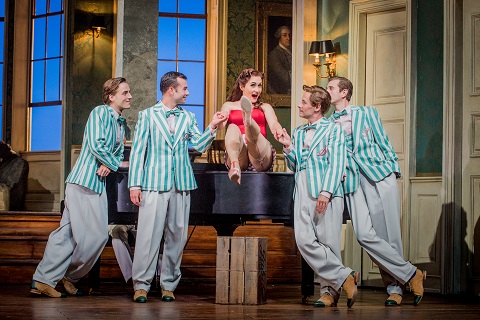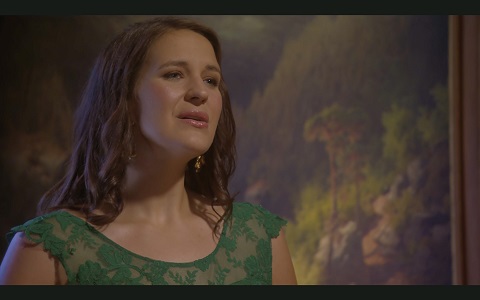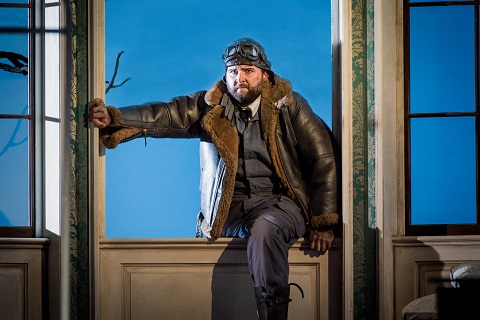When, in the Prologue, the Dancing Master jokes that the commedia dell’arte troupe’s vaudeville would be better performed after the new opera that His Lordship has commissioned – because
once ‘the great and the good’ have stuffed themselves at dinner they will
be bored stiff by the opera, nod off, and be ready for some more zippy
entertainment – Glyndebourne patrons might feel that the self-referential
nudges are getting a bit sharp.
I’m not sure how many meta-layers one has to plunge through before we’re
into surreal territory, but there is certainly plenty of scope for farce
during Thoma’s Prologue. The Composer, an over-sensitive idealist, becomes
desperate and distraught when he learns that his patron – originally a nouveau riche in eighteenth-century Vienna – has decreed
that his maiden opera, a lofty rendition of the myth of the god Bacchus
rescuing Ariadne from Naxos, must, owing to time pressures over the dining
arrangements, be performed simultaneously with a low-brow comic romp.
During the orchestral prelude, the Music Master and a few lackeys fuss
about with malfunctioning front curtains. As the fraught preparations
unfold, servants mount step-ladders to pin up patriotic bunting
choreographed to the gloriously sensual peaks of Strauss’s score, while
grumpy army personnel and petulant singers whizz back and forth slamming
doors behind them. The palm tree on the ‘set’ of Naxos wilts, emasculated
by drought or by the thought of the entertainment ahead, who knows. A
barbershop quartet in natty green-and-white striped blazers put their feet
through their paces and try out their poses (Strauss’s score indicates that
they enter in ‘goose-step’ which despite the period setting Thoma wisely
eschews), while the Prima Donna dons a leopard skin coat and, towering over
the haughty Major-Domo, threatens to flounce out in pique.
The only one with a cool head is Thomas Allen’s Music Master and even he is
momentarily wrong-footed by the butler’s announcement of His Lordship’s
unusual request. As unswervingly dependable as ever, Allen’s diction and
acting is superlative in the secco recitative: he placates the
chest-puffing Tenor, destined for the role of Bacchus, and cajoles the diva
soprano – she’ll be deemed even more sublime when judged against such
riff-raff – and all prepare to get the show underway.
As the troupe’s leading lady, Zerbinetta, tries to win round the despairing
Composer with a kiss, Strauss and Hofmannsthal entwine the opera’s two
themes: the role of art in society and the nature of true love. Is this
kiss, as Zerbinetta suggests, just a fleeting instant never to be relived
or, as The Composer hopes, an eternal moment never to be forgotten?
 Four comedians (Daniel Miros?aw, Bjˆrn B¸rger, Manuel G¸nther, FranÁois Piolino), Dancing Master (Michael Laurenz) and Zerbinetta (Erin Morley). Photo credit: Robert Workman.
Four comedians (Daniel Miros?aw, Bjˆrn B¸rger, Manuel G¸nther, FranÁois Piolino), Dancing Master (Michael Laurenz) and Zerbinetta (Erin Morley). Photo credit: Robert Workman.
Attention is diverted, however, by looming shadows which are cast by the
wings of a Luftwaffe squadron that swoops low over the gardens. The House
takes a direct hit, the blast of explosive sparks usurping the promised
firework display. Dinner guests, downstairs staff and artistes evacuate the
burning building, with just the Composer left behind, writhing in despair,
clutching his score and begging to be allowed to die with his integrity and
artistic ideals intact: ‘Tod und Verkl‰rung’ indeed.
At this point, Strauss asks us to sit back, watch the ‘hybrid
entertainment’ and judge for ourselves between ‘high’ and ‘low’ art, and
between unwavering faithfulness and cheerful promiscuity. Thoma, however,
does not present us with the opera-within-an-opera but side-steps into a
different narrative. The director professes to wish us to imagine that
‘something major happens between Parts 1 and 2’ and that the catastrophe of
war has thrown The Composer ‘into a more urgent situation’.
So, we return to the manor house a few months later and discover that it is
now serving as a hospital for the wounded and traumatised. Instead of
naiads we have Florence Nightingales who tend to the nightmare-afflicted
PTSD sufferers. To account for the presence of Zerbinetta and the
harlequinade, Thoma turns them into ENSA entertainers who are preparing a
wartime variety show to perk up the patients.
I’m not sure that soft shoe shuffles and musical hall ditties are the best
kind of music therapy for the severely traumatised. When the sleeping
Ariadne wakes, she entreats her entertainers to be relieved of the
heartbreak of life; for a moment, I was reminded that the popular
translation of the acronym ENSA was ‘Every Night Something Awful’.
In fact, the dapper quartet – Bjˆrn B¸rger (Harlequin), FranÁois Piolino
(Scaramuccio), Daniel Miros?aw (Truffaldino) and Manuel G¸nther (Brighella)
– croon charmingly and gambol with panache. And, taken on its own terms
Thoma’s concept works well. The problem is that it has nothing to do with
Strauss and Hofmannsthal’s intention that after the ‘realism’ of the
Prologue we should be offered an artifice, the juxtaposition cleverly
guiding us to interrogate the relationship between art and life. In
literalising the question – making the Composer ‘face the reality that not
only artistic interferences but the outside world are breaking into his
ivory tower’ – Thoma disturbs the subtle balance and interplay devised by
the original creators.
That said, this cast are so good that one can push such matters aside and
simply enjoy the fantastic singing. Angela Brower’s Composer has theatrical
presence and flashes with fury when his dream debut is being sabotaged.
Brower is convincingly elevated and ecstatic when singing of the redeeming
power of music, shaping the arioso beautifully.
Erin Morley’s frivolous, flirtatious Zerbinetta injects some vitality amid
the misery and morbidity. When teasing The Composer, Morley apes his
lyricism with tenderness, and her soprano sparkles through the roulades of
her virtuoso showpiece, in which she advises Ariadne to adopt a laissez faire worldliness in her romantic liaisons. Her agility
and reliability at the top did not seem to merit the punishment – being
locked into a straitjacket – that the staid ward sisters inflict upon
Zerbinetta.
 Lise Davidsen (Ariadne). Photo credit: Robert Workman.
Lise Davidsen (Ariadne). Photo credit: Robert Workman.
To say that Lise Davidsen is head-and-shoulders above the rest is not just
a reflection on her statuesque height. Davidsen’s gloriously full and
shining soprano transforms Ariadne – draped in a black hospital
dressing-gown – back into a ‘goddess’. It’s no effort for Davidsen to swell
through Strauss’s elated vocal peaks, her soprano bursting with lustre, but
she can hold her huge voice back, too, shaping cool threads of sound to
convey Ariadne’s vulnerability. Her reminiscence of love with Theseus was
one of those moments when time seemed to stand still, triggering thoughts
that at the premiere of the lament’s progenitor, Monteverdi’s 1607 setting
of the same myth, it was recorded that ‘There was not one lady who failed
to shed a tear’. And, in her joyful anticipation of death, Davidsen
retained a grace and nobility which rose above the context.
Thoma struggles to make Bacchus’s arrival and subsequent wooing of Ariadne
convincing. Bacchus has escaped from the sea nymph Circe and when he is
spied approaching Naxos, Ariadne mistakes him first for Theseus and then
for Hermes the Messenger of Death for whom she has been calling. AJ
Glueckert’s Bacchus is not water-borne – the hospital is clearly not
located by the seaside – but arrives by air. He’s a Battle of Britain pilot
and it’s not clear who or what he’s escaped from, but once he has clambered
through the window he’s quickly urged by the dulcet trio of Naiad (Hyesang
Park), Dryad (Avery Amereau) and Echo (Ruzan Mantashyan) to continue his
song and assuage Ariadne’s grief.
 AJ Glueckert (Bacchus). Photo credit: Robert Workman.
AJ Glueckert (Bacchus). Photo credit: Robert Workman.
When Hofmannsthal wrote to Strauss clarifying the ‘meaning’ of the end of
the opera, the composer encouraged him to publish what has become known as
the ‘Ariadne letter’: the librettist explains that Ariadne and Bacchus are
‘transformed through mutual influence – she was prepared to die but reborn
as immortal heavenly body; Bacchus realises the full nature of his
divinity’. In the hospital ward, such thoughts seemed a long way off.
Believing that she is about to be conducted to the land of the dead,
Davidsen blindfolds herself and kneels before Hermes/Bacchus, but he seems
unconcerned during her appeal to be released her from earthly suffering,
preferring to read the newspaper. Fortunately, Glueckert’s appealing tenor
is youthful and rich, and he has the stamina required to survive Strauss’s
seemingly endless denial of the need for a perfect cadence. The final,
lengthy duet certainly was ‘godly’.
Conducted by a sprightly Cornelius Meister, the London Philharmonic
Orchestra played with airiness and clarity, the chamber-like forces rising
to the challenges of Strauss’s instrumental sonorities. The lead clarinet
and horn were especially elegant.
In a programme article, Thoma describes the opera as both a debate about
merit of high and low art and ‘a journey from despair and disappointment to
hope’. Her white hospital robe effectively becoming her wedding gown,
Ariadne retreats behind the bed-curtains – which have been miraculously
hoisted to the ceiling and are being gently stirred by wafts of air (has
Bacchus left the window open?) – where she and Bacchus can be heard in
rapturous celebration of their love.
The Composer reappears bearing a suitcase – he’s been discharged having
apparently recovered from his mental anguish – and is amazed to espy
his former idol canoodling with a fighter-pilot cum Greek god. In his
astonishment, he spots the score of his opera lying on the table and flicks
through to the final pages. There is a pause, a wry smile, a quick glance
back at the transfigured couple, before our ‘hero’ departs reconciled,
redeemed, restored. It is as if, in the opera’s final moments, Thoma has
remembered The Composer’s climactic phrase from the Prologue: ‘Musik ist
eine heilige Kunst’.
Claire Seymour
Richard Strauss: Ariadne auf Naxos
Ariadne – Lise Davidsen, Composer – Angela Brower, Zerbinetta – Erin
Morley, Bacchus – AJ Glueckert, Music Master – Thomas Allen, Dancing Master
– Michael Laurenz, Scaramuccio – FranÁois Piolino, Harlequin – Bjˆrn
B¸rger, Brighella – Manuel G¸nther, Truffaldino – Daniel Miros?aw, Naiad –
Hyesang Park, Dryad -Avery Amereau, Echo – Ruzan Mantashyan, Major-Domo –
Nicholas Folwell, Lackey – Edmund Danon, Officer – John Findon; Director –
Katharina Thoma, Conductor – Cornelius Meister, Set Designer – Julia M¸er,
Costume Designer – Irina Bartels, Lighting Designer – Olaf Winter, London
Philharmonic Orchestra.
image=http://www.operatoday.com/The%20Composer.jpg
image_description=Ariadne auf Naxos, Glyndebourne
product=yes
product_title= Ariadne auf Naxos , Glyndebourne
product_by=A review by Claire Seymour
product_id=Above: Angela Brower (The Composer)
Photo credit: Robert Workman